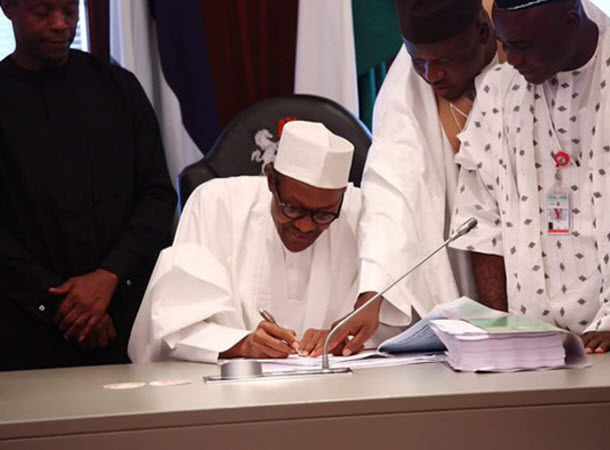There are no products in your shopping cart.
| 0 Items | £0.00 |

 PRESIDENT Muhammadu Buhari has signed Nigeria's 2020 Finance Bill into law enacting this year's annual budget aimed at getting the economy off to a good start with an emphasis on infrastructural development.
PRESIDENT Muhammadu Buhari has signed Nigeria's 2020 Finance Bill into law enacting this year's annual budget aimed at getting the economy off to a good start with an emphasis on infrastructural development.
In October, President Buhari presented his 2020 budget to the National Assembly with projected spending of N10.33trn ($28.4bn) centred around significant investment in capital projects to create jobs and develop infrastructure. Funding for the 2020 budget is based on an oil production estimate of 2.18m barrels per day at a price of $57 per barrel and an exchange rate of N305 to a dollar.
Other benchmarks are a real GDP growth rate of 2.93% while the inflation rate is expected to remain slightly above single digits in 2020. It is anticipated that about $9bn will go on infrastructural developments but this only scratching the surface as the African Development Bank estimates that Nigeria has an annual infrastructural deficit of $100bn.
However, Nigeria may just about be able to raise the $28.4bn required to fund the budget as during December, oil output rose to 2.2m barrels a day, surpassing the quota of 1.77m barrels a day set by the Organisation of Petroleum exporting Countries. Also, with the recent standoff between the US and Iran, global crude oil prices have risen to about $70 a barrel over the last week.
Presidential spokesman Femi Adesina, said: “This Finance Bill has five strategic objectives, in terms of achieving incremental but necessary changes to our fiscal laws. These objectives are promoting fiscal equity by mitigating instances of regressive taxation and reforming domestic tax laws to align with global best practices.
“Others are introducing tax incentives for investments in infrastructure and capital markets, supporting micro, small and medium-sized businesses in line with our ease of doing business reforms and raising revenues for government. The draft Finance Bill proposes an increase of the VAT rate from 5% to 7.5%, as such, the 2020 Appropriation Bill is based on this new rate."
He added that with the assent, there would be more revenue to finance key government projects especially in the areas of health, education and critical infrastructure. Traditionally, however, Nigeria has always struggled to achieve full budget implementation, with it rarely surpassing 60% annually.